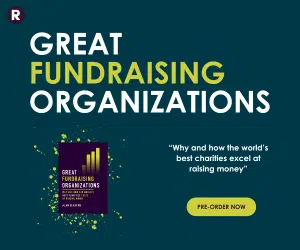Disaster preparedness?
Actor Nigel Havers presented the Disasters Emergency Committee’s television appeal on Thursday 12 November to highlight the needs of the people of Nicaragua and Honduras in the wake of Hurricane Mitch. Donors were encouraged to give via the telephone and via local bank branches, but there was no option for donors to give via the Internet.
At the end of 1998, this is a conspicuous absence. There might well be good reasons for the DEC’s decision not to use a secure online donation facility, but cost is surely no longer a barrier. Strangely enough, charity members of the DEC such as Oxfam have been accepting secure online donations for over two years. A site might appear soon, but it will be nearly two weeks late in offering the UK public an immediate central, official channel for their donations.
Read UK Fundraising’s report on other non-profits’ online reaction to Hurricane Mitch, which now includes responses from UK Fundraising readers.
Howard Lake reports:
Advertisement
Actor Nigel Havers presented the Disasters Emergency Committee’s television appeal on Thursday 12 November to highlight the needs of the people of Nicaragua and Honduras in the wake of Hurricane Mitch. Donors were encouraged to give via the telephone and via local bank branches, but there was no option for donors to give via the Internet.
At the end of 1998, this is a conspicuous absence. There might well be good reasons for the DEC’s decision not to use a secure online donation facility, but cost is surely no longer a barrier. Strangely enough, charity members of the DEC such as Oxfam have been accepting secure online donations for over two years. A site might appear soon, but it will be nearly two weeks late in offering the UK public an immediate channel for their donations.
This gap has been filled by US charities, such as Care, and to an extent by the Charities Aid Foundation with its Millennium Gift Aid WorldPeople Web site. Indeed, CAF have been pointing out that Nicaragua and Honduras both qualify as beneficiary countries for poverty and educational projects under the Government’s Millennium Gift Aid scheme.
If UK Fundraising learns of a DEC Web site, its address will be published here.
Meanwhile, PLUS Lotto , the online lottery that helps raise money for the International Federation of Red Cross and Red Crescent Societies, is focusing on the aftermath of Hurricane Mitch. It announced on 13 November that all funds generated as a result of play at PLUS Lotto between then and Christmas Day will be sent directly to the Hurricane Mitch Appeal to help those left in need by the disaster.
UNICEF too accepts secure online donations for relief work amongst those affected by the hurricane. Sensibly the UNICEF Alert! Web site addresses potential donors from countries other than the USA. “If you live outside the U.S. please click here” suggests the donation page. You can then select your country before being taken to a relevant donation page. However, the page served to UK donors still uses US dollar signs both in the suggested donation figures and in the examples of how much various sums will buy. Still, UNICEF are clearly attempting to track every Internet-generated donation: donors who wish to use the post are encouraged to send their donations to UNICEF marked with “Attention: ChildrenFirst Internet Donation” on the envelope.
UNICEF’s site also encourages donors to pass on information about UNICEF’s efforts in relation to Hurricane Mitch. You can either tell them directly, or you can use the UNICEF automated form. Here you type in the name and e-mail address of your friend or friends and UNICEF itself contacts them directly. This gives UNICEF the opportunity to provide further information on its work to these contacts.
Yahoo! has provided extensive coverage of the Hurricane and its devastation. It is one of the more comprehensive sources of information on where to find out how to give to charities involved in the relief work. Aid agencies might take note that search engines and portals have become a key resource for breaking news, and could therefore offer a valuable location for publishing information on how supporters can help non-profits with financial or other material donations. http://www.csmonitor.com/durable/1998/11/04/f-p10s3.shtml
Mitch-relief is an e-mail discussion list that was set up “to network people and organizations involved in the relief effort in Honduras and other countries in the aftermath of Tropical Storm Mitch.” Announced on 18 November, it aims to “facilitate communication among those involved, the networking of resources, and the dissemination of vital information.” As well as being a channel for contributions of news items and information on resources, the list will also carry “requests for assistance from relief organizations and individuals.”



